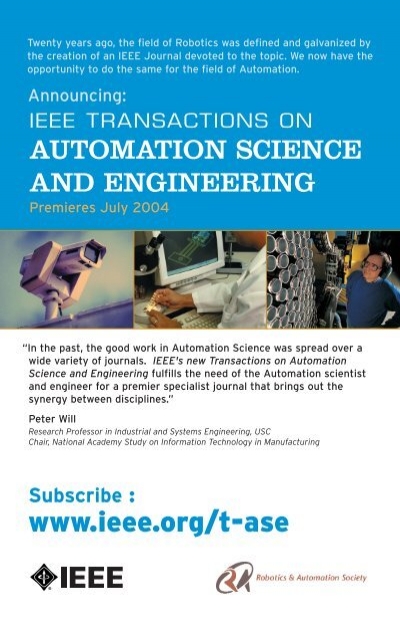Secure Control of T–S Fuzzy-Based Nonlinear Active Quarter-Vehicle Suspension Systems Under Malicious Attacks With Experimental Validation
IF 6.4
2区 计算机科学
Q1 AUTOMATION & CONTROL SYSTEMS
IEEE Transactions on Automation Science and Engineering
Pub Date : 2025-01-20
DOI:10.1109/TASE.2025.3531928
引用次数: 0
Abstract
It is challenging to ensure the safety of vehicles in the presence of malicious attacks. For this reason, the security control problem of nonlinear active quarter-vehicle suspension systems (QVSSs) is investigated in this paper. Within transportation cyber-physical systems, a specific Takagi-Sugeno fuzzy representation is adopted to capture the nonlinear behavior of vehicle dynamics. Firstly, accurately capturing the randomness and variability of attacks within complex driving environments poses a challenge. To precisely model the randomness of attacks, a probabilistically uncertain denial of service (PUDoS) attack strategy is adopted, thereby providing a practical range for potential attacks. Secondly, a novel probability-dependent homogeneous polynomial non-quadratic control law (PHNQCL) is designed. On the one hand, the high-order character of the controller enables the introduction of more groups of gain matrices, enhancing the control flexibility and reducing the conservatism. On the other hand, the designed controller exhibits strong defense capabilities against PUDoS attacks. Subsequently, feasible criteria for the PHNQCL are established using a high-order Lyapunov function, which not only stabilizes the active QVSSs but also reduces the conservatism. Finally, hardware-in-the-loop tests serve to validate the feasibility of the proposed method. Note to Practitioners—As a critical part of automotive chassis, the active quarter-vehicle suspension systems (QVSSs) are crucial for improving ride comfort and ensuring handling stability. However, in real-world environments, external disturbances, uncertainties, and nonlinearities can degrade their performance. As networks evolve, the interconnections in active QVSSs increase. This makes communication channels more vulnerable to attacks, further compromising vehicle safety. This paper explores security control for nonlinear QVSSs, modeling them using T-S fuzzy logic to capture vehicle dynamics. To simulate a complex vehicle driving environment, a probabilistically uncertain DoS attack strategy is designed. The challenge is to design new control methods to mitigate the performance degradation caused by attacks while enhancing vehicle safety in diverse scenarios. Hardware-in-the-loop tests are performed to verify that the proposed control algorithm can provide strong operational stability, ride comfort, and protection of vehicle components.基于T-S模糊的非线性主动悬架系统在恶意攻击下的安全控制及实验验证
在存在恶意攻击的情况下,确保车辆的安全是一项挑战。为此,本文研究了非线性主动悬架系统的安全控制问题。在交通网络物理系统中,采用特定的Takagi-Sugeno模糊表示来捕捉车辆动力学的非线性行为。首先,在复杂的驾驶环境中准确捕捉攻击的随机性和可变性是一个挑战。为了精确地模拟攻击的随机性,采用了概率不确定的拒绝服务攻击策略,从而为潜在攻击提供了一个实际的范围。其次,设计了一种新的概率相关齐次多项式非二次控制律(PHNQCL)。一方面,该控制器的高阶特性使其可以引入更多组增益矩阵,提高了控制的灵活性,降低了保守性。另一方面,所设计的控制器对PUDoS攻击具有较强的防御能力。利用高阶Lyapunov函数建立了pnqcl的可行准则,既稳定了有源qvss,又降低了保守性。最后,硬件在环测试验证了所提方法的可行性。作为汽车底盘的关键部分,主动四分之一车辆悬架系统(qvss)对于提高乘坐舒适性和确保操纵稳定性至关重要。然而,在现实环境中,外部干扰、不确定性和非线性会降低它们的性能。随着网络的发展,有源qvss的互连也在增加。这使得通信通道更容易受到攻击,进一步危及车辆安全。本文探讨了非线性qvss的安全控制,使用T-S模糊逻辑对其建模以捕获车辆动力学。为了模拟复杂的车辆行驶环境,设计了一种概率不确定的DoS攻击策略。挑战在于设计新的控制方法,以减轻攻击造成的性能下降,同时提高车辆在不同场景下的安全性。硬件在环测试验证了所提出的控制算法能够提供较强的运行稳定性、乘坐舒适性和对车辆部件的保护。
本文章由计算机程序翻译,如有差异,请以英文原文为准。
求助全文
约1分钟内获得全文
求助全文
来源期刊

IEEE Transactions on Automation Science and Engineering
工程技术-自动化与控制系统
CiteScore
12.50
自引率
14.30%
发文量
404
审稿时长
3.0 months
期刊介绍:
The IEEE Transactions on Automation Science and Engineering (T-ASE) publishes fundamental papers on Automation, emphasizing scientific results that advance efficiency, quality, productivity, and reliability. T-ASE encourages interdisciplinary approaches from computer science, control systems, electrical engineering, mathematics, mechanical engineering, operations research, and other fields. T-ASE welcomes results relevant to industries such as agriculture, biotechnology, healthcare, home automation, maintenance, manufacturing, pharmaceuticals, retail, security, service, supply chains, and transportation. T-ASE addresses a research community willing to integrate knowledge across disciplines and industries. For this purpose, each paper includes a Note to Practitioners that summarizes how its results can be applied or how they might be extended to apply in practice.
 求助内容:
求助内容: 应助结果提醒方式:
应助结果提醒方式:


